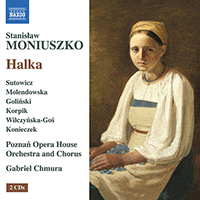Moniuszko’s Halka
Stanisław Moniuszko (1819-1872): Halka [Opera]
Dominik Sutowicz, Magdalena Molendowska, Łukasz Goliński, Poznań State Moniuszko Opera House Chorus and Orchestra, Gabriel Chmura – cond.
NAXOS 8.660485-86
From the website Naxos.com:
 Polish composer, conductor and teacher Stanisław Moniuszko is widely known as ‘the father of Polish national opera’. Halka tells the tragic story of its title character, a peasant girl whose love for the noble Janusz is betrayed when Heons abandoned her to wed Zofia, daughter of the Esquire. Recorded here in an acclaimed production by Poznań Opera House, Halka possesses a deeply lyrical character making it one of the composer’s greatest works. The aria ‘The firs are rustling on the mountain top’ is considered one of the most beautiful of the 19th century. This recording features performances by Dominik Sutowicz, Magdalena Molendowska, Łukasz Goliński, Poznań State Moniuszko Opera House Chorus and Orchestra, and conducted by Gabriel Chmura
Polish composer, conductor and teacher Stanisław Moniuszko is widely known as ‘the father of Polish national opera’. Halka tells the tragic story of its title character, a peasant girl whose love for the noble Janusz is betrayed when Heons abandoned her to wed Zofia, daughter of the Esquire. Recorded here in an acclaimed production by Poznań Opera House, Halka possesses a deeply lyrical character making it one of the composer’s greatest works. The aria ‘The firs are rustling on the mountain top’ is considered one of the most beautiful of the 19th century. This recording features performances by Dominik Sutowicz, Magdalena Molendowska, Łukasz Goliński, Poznań State Moniuszko Opera House Chorus and Orchestra, and conducted by Gabriel Chmura
About the Composer:
Stanisław Moniuszko was a Polish composer, conductor and teacher who wrote many popular art songs and operas, with his music being particularly notable for its patriotic folk themes from the former Polish–Lithuanian Commonwealth.
In 1848, Moniuszk’s two-act version of the opera Halka had its premiere staging in Vilnius, conducted by the composer himself. A decade later, following the triumphant Warsaw premiere of the four-act version of Halka on 1 January 1858, Moniuszko was appointed the first conductor of the Polish Opera at the Teatr Wielki (Grand Theatre) in Warsaw on 1 August 1858. The same year, Moniuszko put on his one-act opera Flis, followed by the staging of all of the subsequent operas during his 15-year term.
Moniuszko’s music has earned him widespread recognition in his home country, where he is widely referred to as ‘the father of Polish national opera’. He died of a heart attack on 4 June 1872 in Warsaw.
Penderecki’s String Quartets & Trio
Music for String Quartet (Complete) / String Trio
Krzysztof Penderecki (1933–2020): String Quartet No. 1; String Quartet No. 2; Der unterbrochene Gedanke; String Trio; String Quartet No. 3, “Leaves from an Unwritten Diary”; String Quartet No. 4
Tippett Quartet
NAXOS 8.574288
From the website Naxos.com:
 Penderecki wrote music for string quartet over a period of 56 years. His String Quartet No. 1 was written in the same year that he achieved international success with Threnody (Naxos 8.554491), and includes a wide range of playing techniques reflective of the avant-garde. String Quartet No. 2 reveals the influence of Ligeti, while No. 3 is a personal, even autobiographical work. In No. 4 there are modal or even folk inflections, in writing that is both limpid and abrasive. The eventful Der unterbrochene Gedanke completes Penderecki’s music for quartet, while the String Trio exemplifies his music’s motoric energy. This recording features the Tippett Quartet.
Penderecki wrote music for string quartet over a period of 56 years. His String Quartet No. 1 was written in the same year that he achieved international success with Threnody (Naxos 8.554491), and includes a wide range of playing techniques reflective of the avant-garde. String Quartet No. 2 reveals the influence of Ligeti, while No. 3 is a personal, even autobiographical work. In No. 4 there are modal or even folk inflections, in writing that is both limpid and abrasive. The eventful Der unterbrochene Gedanke completes Penderecki’s music for quartet, while the String Trio exemplifies his music’s motoric energy. This recording features the Tippett Quartet.
About the Composer:
Krzysztof Penderecki (1933–2020) studied at the Academy of Music in Krakow, then at the Jagiellonian University, before he established himself at the Warsaw Autumn Festivals of 1959 and 1960. He soon became part of the European avant-garde, achieving international success with Threnody [Naxos 8.554491], where he imparted an intensely expressive vein to what was his then ‘sonorist’ musical language. The St Luke Passion [8.557149] proved just how successful this idiom could be in sacred music, and he continued to be inspired by religious themes, as is witnessed by his cantatas, oratorios and operas.
During the mid-1970s, however, such an involvement with tradition became deeper, Penderecki embarking on a dialogue with music rediscovered for himself as he internalized the post-Romantic tradition and then combined it with the technical hallmarks of his earlier music. Works composed in this later idiom include the concertos for violin [8.555265], for cello and viola [both 8.572211], the Second Symphony [8.554492], the opera Paradise Lost, the Te Deum [8.557980] and A Polish Requiem [8.557386-87]. Continued formal and stylistic investigation resulted in operas such as the expressionist The Black Mask or the satirical Ubu Rex as well as the oratorios Seven Gates of Jerusalem [8.557766] and Credo [8.572032] – all of them informed by an acute expression together with a refined array of technical means. This evolutionary process continued until the composer’s death in Krakow on 29 March 2020.
[Source: NAXOS]